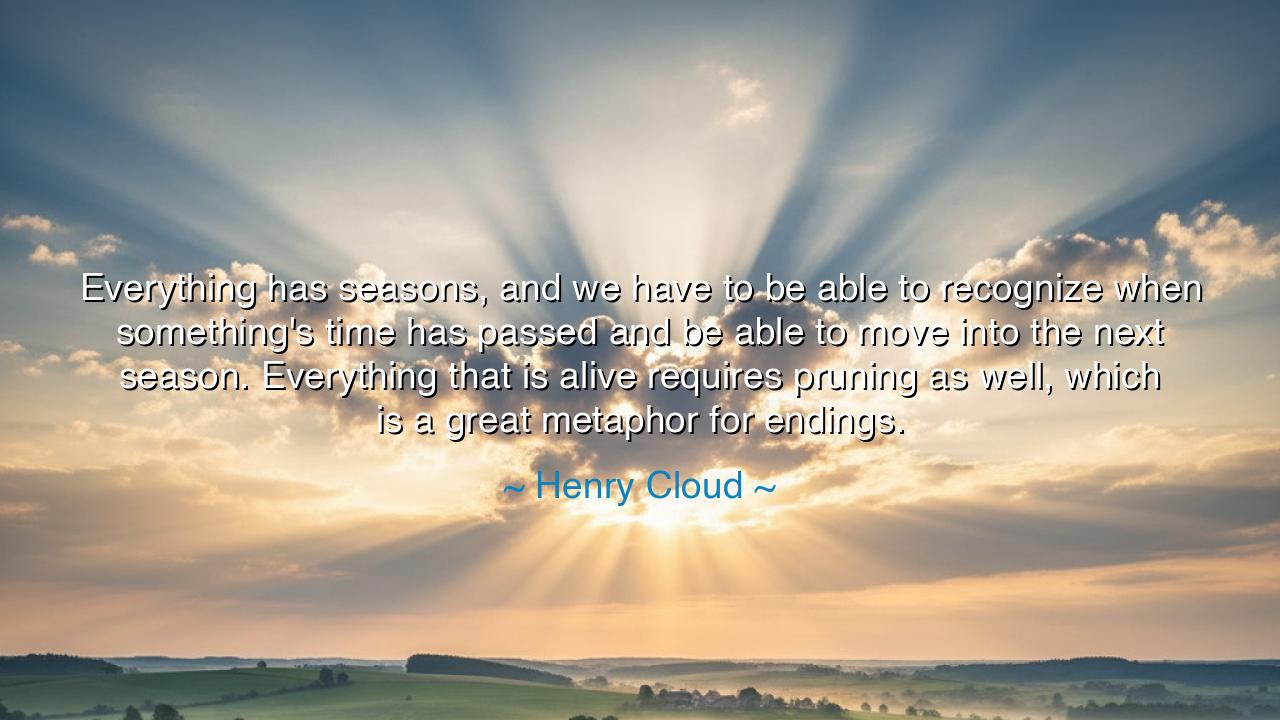
Everything has seasons, and we have to be able to recognize when
Everything has seasons, and we have to be able to recognize when something's time has passed and be able to move into the next season. Everything that is alive requires pruning as well, which is a great metaphor for endings.






In the words of Henry Cloud, we hear a truth as old as time itself: “Everything has seasons, and we have to be able to recognize when something’s time has passed and be able to move into the next season. Everything that is alive requires pruning as well, which is a great metaphor for endings.” This wisdom, simple yet profound, echoes the eternal rhythms of nature and the soul. It reminds us that life moves not in a straight line, but in cycles — birth and death, growth and decay, sowing and harvest, holding on and letting go. To resist these rhythms is to resist life itself; to accept them is to walk in harmony with the deeper laws of the universe.
The ancients understood that seasons are not merely a matter of weather, but of the heart and spirit. The spring of our beginnings fills us with hope and possibility; the summer brings the flowering of effort and joy; the autumn calls for reflection and gratitude; and the winter strips us bare, so that new life may come again. So it is with our work, our relationships, and even our dreams. Each has its appointed time. Yet, as Cloud teaches, wisdom lies not in clinging to what once was, but in knowing when its time is done. For only those who release the old can receive the new.
Pruning is the art of endings — the courageous act of removing what no longer gives life, that something stronger may take its place. A gardener who fears to prune condemns the vine to weakness and decay. Likewise, the soul that refuses to let go of what has withered — the friendship that no longer uplifts, the ambition that has turned to burden, the habit that stifles rather than nourishes — traps itself in the past. But when we prune with faith, when we surrender with grace, we make space for the next season of growth.
In the story of Abraham, there is a moment when he is called to leave his homeland, his family, and all that is familiar, and journey toward a promise unseen. His obedience marks not loss, but transformation — a movement from one season of life to another. Had he remained among his roots, fearing the unknown, he would never have become the father of nations. So too must we heed the whisper that tells us: “This chapter is complete.” To stay beyond the time of life’s call is to wither; to move on when the spirit commands is to bloom anew.
There is also the tale of the cherry tree, which each winter seems dead to the world. Its branches are cut, its blossoms gone. Yet the wise gardener knows that beneath the bark, life gathers strength. When the sun returns, the tree bursts into bloom, more radiant than before. In this we find the sacred rhythm of pruning — that endings are not death, but preparation. The pain of cutting away is the promise of future fruit.
Henry Cloud’s words challenge the fear within us that whispers, “Hold on.” But life whispers something gentler, truer: “Trust.” To let go is not to lose; it is to make room for what must come next. The soul, like the earth, must shed its leaves so that new roots may deepen. If we can learn to see endings not as failure but as fulfillment, then even our losses will bear fruit.
Let this be the teaching: honor the seasons of your life. When something has given all it can, release it with gratitude. When change comes, meet it not with bitterness but with curiosity. Ask, “What new season is being born?” For to live well is not to cling forever to spring, but to walk through every season with grace — sowing, harvesting, letting go, and beginning again.
Action for the living: Reflect on what must be pruned in your own life — the habits, attachments, or pursuits that no longer serve your growth. Thank them for what they gave you, and set them free. Then turn your face toward the next horizon, trusting that every ending carries within it the seed of rebirth. Remember always: to move with the seasons is to live in harmony with the eternal — and to resist them is to stand still while the universe continues to bloom.






AAdministratorAdministrator
Welcome, honored guests. Please leave a comment, we will respond soon